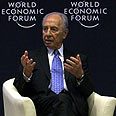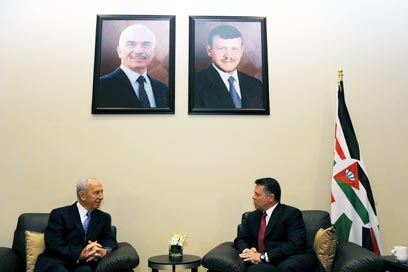
Peres to Assad: Don't be shy
Syrian President Assad should not by 'shy,' embark on direct talks with Israel if he truly wants peace, Peres says Sunday; president meets with Jordan's King Abdullah, says Israel willing to resume talks with Palestinians immediately
JORDAN - President Shimon Peres told reporters in Jordan Sunday that if Syria is interested in peace it must engage in direct talks with Israel.
"If (President Bashar) Assad wants peace, then why is he shy about it? We offered him to begin direct talks on numerous occasions," Peres said. "(Egyptian) President Sadat changed the entire Middle East in an hour when he got on a plane and came to Israel. Sadat offered President Hafaz Assad to do the same, but he refused."
Peres added that his meeting earlier with Jordan's King Abdullah was "warm and friendly." The president met with the Jordanian king Sunday on the sidelines of the World Economic Forum on the Middle East.
Speaking to reporters before the meeting, Peres said he would tell the Abdullah that Israel was prepared to continue negotiations with the Palestinians immediately and discuss the king's statement according to which "57 countries want to make peace with Israel."
"This is a great idea and it should be examined," the president said.
Asked about the two-state proposal, which Benjamin Netanyahu refuses to back publicly, Peres said "the prime minister said he would implement the commitments of previous governments. The government has accepted the Road Map."
In response to comments made earlier Sunday by Arab League chief Amr Moussa, who said the Arabs were concerned more with Israel's nuclear capabilities than with Iran's, the president said "I suggest that Moussa check why Iran wants to destroy Israel before he raises the issue of armament."

Peres, King Abdullah II meet in Jordan (Photo: Amos Ben-Gershom, GPO)
On Thursday Netanyahu met with King Abdullah in the Red Sea city of Aqaba. The Jordanian leader urged the Israeli PM to commit to the establishment of a Palestinian state alongside Israel and accept the Arab peace initiative.
Netanyahu did not endorse the two-state plan, but did say he was "aware of the need to advance the negotiations with the Palestinians."
On Friday Abdullah reiterated his call for Israel to adopt the two-state solution, saying that "a stalemate in the diplomatic process is not an option."
Jordanian Foreign Minister Naser Joudeh told Ynet on Sunday that the Arab peace initiative, submitted in Beirut in 2002 and ratified by the Arab League in Doha in 2007, "will not change; it is final."
The initiative calls for Israel's return to '67 borders in exchange for recognition from and normalization of ties with 22 Arab states. It is ambiguous regarding the Palestinians' right of return.










